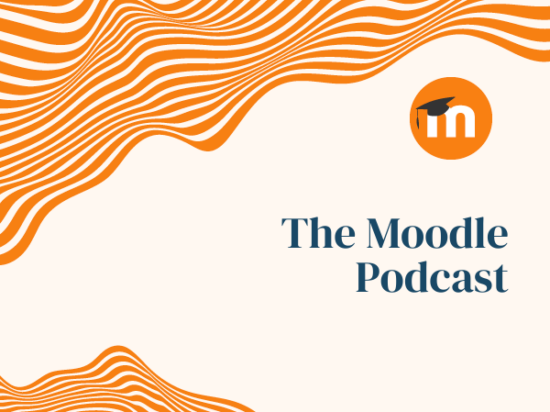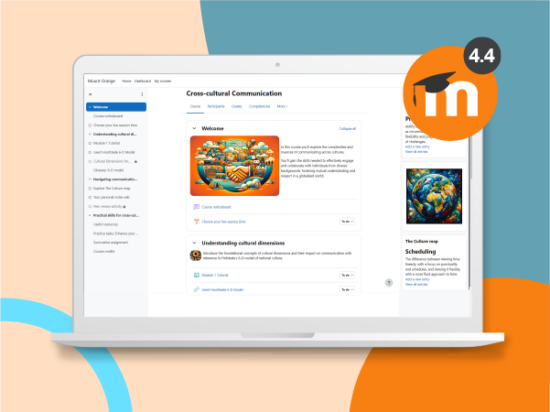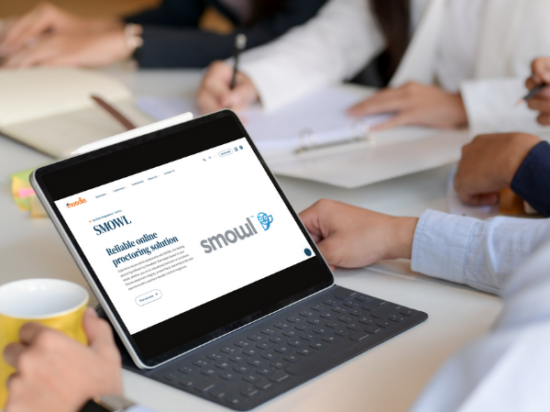On Thursday 13 July, our Founder and CEO, Martin Dougiamas, appeared as a guest in the Future Trends Forum, hosted by Bryan Alexander.
If you are not familiar with Bryan and his work, he is a futurist, researcher, writer, speaker, consultant and teacher, working in the field of how technology transforms education.
Through his blog, Bryan runs the Future Trends Forum – an ongoing, participatory, and open video conversation about the future of higher education.
The last couple of forums have focussed on the learning management system, which Bryan described as “one of the central ed technologies, as well as one of the most controversial and yet also accepted as a nearly universal commonplace.”
Described as “only the creator and global cat-herder of Moodle – the leading open source LMS and one of the world’s two leading such systems,” Martin guest appeared in the forum to ask questions on:
“Where he sees Moodle heading over the next decade?”
“How Moodle software and its supporting community will evolve in response to increasing use of mobile devices, to gamification, to big data, data analytics, personalised learning and more?”
“How does he see the overall LMS domain changing?”
Let’s delve into some of the topics explored / questions asked and what Martin has to say about them.
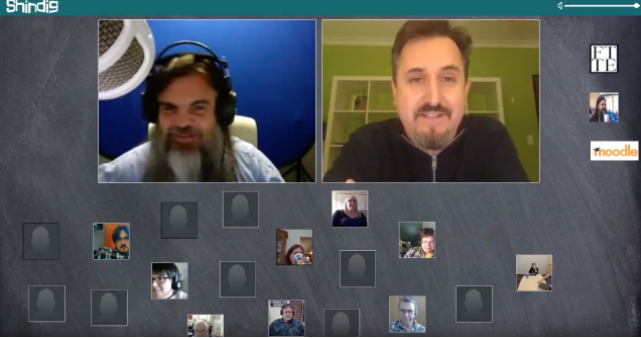
In 2017, what is your job with Moodle now?
Bryan started the questions rolling by asking Martin what his role with Moodle today involves.
Martin commented that apart from starting the original Moodle, his main role as CEO is to bring sustainability to our open source project. He does this through the Moodle company – which manages the whole ecosystem so that Moodle moves forward and becomes what people want it to be.
What is the status of Moodle’s sustainability and how do you keep it going?
Following on Martin’s comment on the importance of sustainability for Moodle’s open source project, Bryan asked about how do we at Moodle HQ create or achieve this?
Martin firstly answered by saying that Moodle is doing well and that we, as a platform and an organisation has never stopped growing. Moodle has been in the public eye/domain for about 15 years now and our focus today is on being “vanguards” for people, educators, who believe in openness and social justice.
As a result, we have started to refocus our activities, to do a more effective job of spreading openness in education. As Martin said in the forum: “education affects everything that human beings do in this planet.”
Have a read through our Mission re-affirmation to find out more.
Do you see Moodle as an ally for Open Education Resource (OER) and Open Access Publication?
Martin started answering this next question from Bryan with a preface that Moodle is philosophically aligned with open education and from a practical and technical level, we are also aligned.
This is most evident through our new Moodle community site project that Martin summarised as “focussing on joining with other open organisations so that we can be working together more.”
Moodle community 2.0, as has already been mentioned by Martin at his recent keynotes in France and Germany, is all about a service that connects all Moodle sites together with OER and allows for new types of community activities that bring a new age to open education.
Moodle Community 2.0 is a model for creating OER sustainability.
What does Community 2.0 look like?
Still in its infancy stage, Moodle Community 2.0 is about getting people together who are teaching the same course, in the same language to also create content together. Similar to mini kickstarter project models.
Martin illustrates using words that Community 2.0 might see an admin registering with the community to connect the community to their own local site. Inside the community, the admin person will have a Moodle account or identity that people can trust.
That trust can be achieved through a number of activities such as plans for open badges.
Essentially, Moodle Community 2.0 is a social media platform, focussed on educators – it will be built as the place for educators who really care about educating to “hang out with their crew.”
A recent Campus Technology article further summarise and discuss Moodle Community 2.0, which Bryan refers to as what can become a “giant global brain.”
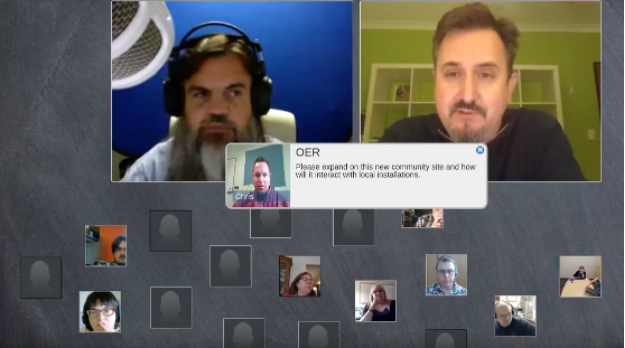
Questions from the audience and Twitter continued for the rest of the discussion and we have selected a few that might of interest. You can also listen to full recording in the link below.
Moodle Partners, Roadmap and Next Gen LMS
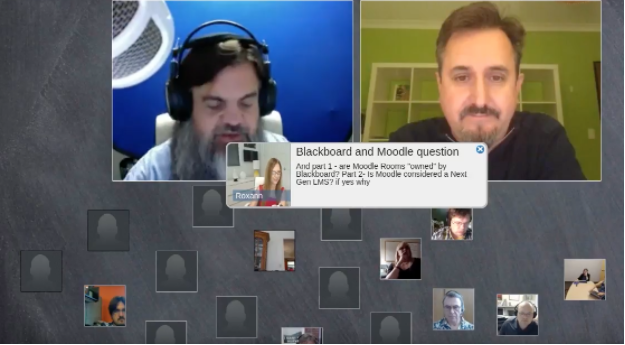
A two part question requesting clarification between Moodlerooms and Blackboard and whether Moodle can be considered a Next Gen LMS was posted.
Martin started to answer this by outlining our Moodle Partner network – we have Partners around the world who offer services and support for Moodle – with 10% of what they make provided to Moodle to help our ongoing development and growth.
One of our Partner is Moodlerooms who started in the US around 2010 (in fact Martin helped to set it up too) and they were competing with Blackboard around 2010 – 2012 and by the end of that latter year, Blackboard bought Moodlerooms – making them a multi LMS provider.
Martin mentioned that outside of the US, Moodle is a much more used LMS and we have over 85 Partners worldwide supporting and creating custom Moodle sites.
Martin mentioned that outside of the US, Moodle is a much more used LMS and we have over 85 Partners worldwide supporting and creating custom Moodle sites.
In answering the question whether Moodle is a Next Gen LMS or not, Martin referred to our Roadmap and indicating that features mentioned as part of Next Gen LMS are what we are doing soon or already in our Roadmap.
At Moodle HQ, we work to develop and improve our learning platform by following the trends of what people are asking for. We constantly do an exercise of consensus finding and building to develop and deliver new features and/or improvements.
A bit about our Roadmap and a focus on usability
Bryan followed up on Martin’s comment on Moodle’s roadmap by asking whether our Roadmap is a “living” thing?
Martin explained that our Roadmap for the next year is mostly about cleaning up what we have and focussing on usability, making our interface sleek, smooth and easily discoverable as possible. We are also on concentrating on converging the mobile and web interfaces.
For example, we are currently updating the Moodle interface where participants and enrolment are being merged. We are also working on improving our Calendar.
Martin mentioned that one of the criticisms we hear a lot is that Moodle out of the box looks a bit old. So we are working on making fixes to address that.
Read about our current Moodle 3.4 major works that focus on usability!
Is the issue perhaps that people don’t realise what’s under the hood?
Questions soon followed about why there are many Moodlers who do not realise that Moodle is highly customisable and have many powerful flexible tools for collaboration.
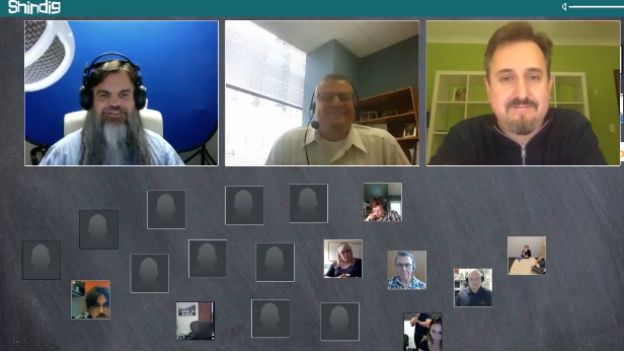
Ed from an institution in Chicago using Moodle said, “is it perhaps that people don’t realise what’s under the [Moodle] hood?”
Martin answered by agreeing that Moodle is highly customisable, it is being used outside of education for research – he refers to people who are creating hypotheses and placing them into Moodle.
One of the main issue is that many people who are using have perhaps never taken an online course so it becomes a struggle to find and use the tools in Moodle for collaborative learning.
Martin then outlined another one of our initiatives which will aim to “attack” this directly. Under the direction of our new Education Manager, Tom Murdock, we have a team working on Moodle training initiatives focussed on pedagogy, how you teach online, how you create experiences for students, how you use Moodle.
The training will be available online, at MoodleMoots, through Moodle Partners as paid training.
What are some of the powerful, flexible tools in Moodle?
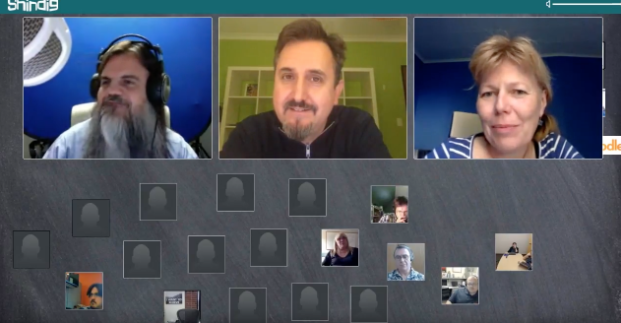
Kirstin, a Moodle administrator at an education institution in Sweden, then posed a question to our Chief Moodler, about how do we find the tools we need in Moodle?
Kirstin explained that she is “one of those people” who miss the good stuff or hardly ever use the array of Moodle tools because she can never find it. She asked for what are some of the tools she can use.
Martin outlined three out of many:
- Survey module: which is one of the first Moodle and plugin that Martin wrote. The survey module have a lot of research behind them and gives you a great view into what the class is doing and how they are feeling. Martin shared how he used to run this survey every week for every course and by looking at the results, the data, what the learners are doing and talking to them you can get interesting outcomes.
- Plugins: in our improved Moodle plugins directory, there are hundreds of plugins that can be installed and extend Moodle sites.
- Quizzes: which can be used in interesting ways. Martin first used quizzes not as an assessment tool but as a learning tool. He used to get students to revise material over and over and created quizzes based on questions on what has happened in the course or discussions and then use the results to revise activities in the course.
Martin concluded by saying learning tools can be used creatively and we should focus on using them to create experiences for students.
Is Moodle withering?
Bryan finished the Future Trend Forum by asking for Martin’s thoughts on the recent article by Phil Hill titled: “Moodle Whither?” which speculated that Moodle’s growth is slowing down and hitting a plateau.
Martin commented that is not the case from what he is seeing and that a lot of the information contained in the article is US-based where there a lot of more LMS vendors and venture capitalists building learning platforms.
But outside of the US, there are less of these LMS vendors.
And the beauty of having a common global, open source platform like Moodle is the ability to share and use the tools, the plugins created anywhere in the world.
Martin ended his comment on this topic by saying what makes our project different is that we are not driven by numbers. We are driven by the needs of our users and that he would be happy if there were only 100 universities using Moodle if we are following that approach. But in fact we of course have millions of users worldwide.
The Future Trend Forum continued with other questions from the audience around:
- Do you see a day when it doesn’t matter what we use for learning because everything will be fluid and interchangeable?
- How can Learning Analytics in Moodle help with personal learning? PS: Check out our Project Inspire
- What can you at Moodle and we at institutions do to push LTI protocol to be a complete integration?
There’s interesting things coming up, so keep an eye on us!
That was Martin’s concluding words…so do keep an eye on us by following us on Twitter or Martin himself @moodler.
Watch the full Future Trend Forum below:

